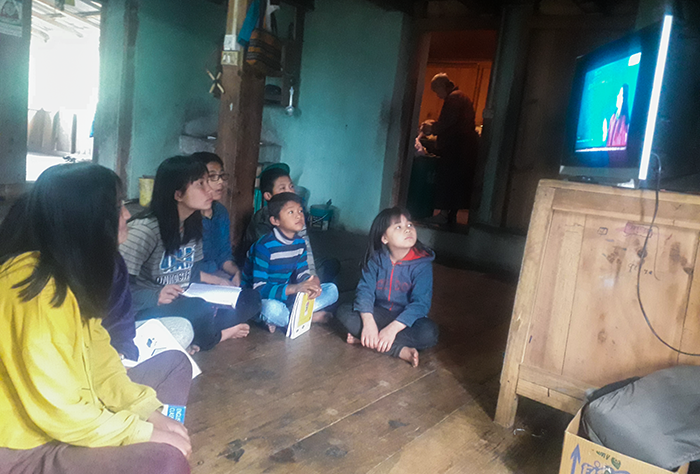Students in remote Bhutan try to not miss out
Neten Dorji & Tshering Namgyal
On a high ridge above the village, 16 students are in a class. The students have walked for about a kilometre to the ridge. It will be their classroom until they return to school.
Without television or mobile network, the students of Yobinang, Shongphu gewog, decided to not miss the online class or the e-learning programme. It has been their routine since March 27.

A student makes space for her friends who don’t have television set to attend to their televised lessons at home in Hurungpan, Mongar
Eldest in the group, Tashi Choden, is the informal captain and guide the others. When it rains, they stay home to complete the homework.
Parents had been cooperative. They let the children use the mobile phones. Some have borrowed their relative’s.
“Without access to Internet services and television, it is an extra burden,” said Tashi Choden. The students bring lunch and return only when the day’s task is completed.
Carrying an old carpet, Mendrel Zangmo was on her way home. She missed two classes after teachers started e-learning lesson. “Without access to the internet, I could not submit homework and assignment on time,” she said. “Sometimes, it takes time to download and upload homework and assignments.”
Another student, Sonam Choden said she could only understand half of the lesson uploaded by teachers. “It is better in the classroom where I can clear my doubts with teachers and friends,” said Sonam.
When the internet speed is poor, students return home with extra burden of completing the day’s lesson the next day.
When they run out of data, they travel to Rangjung, 10 kilometres away. The lucky ones can call their relatives to recharge electronically.
Worried that their children could be left out, parents are supportive of the new learning idea.
A mother, Pema Choden, said that they support and monitor their children. “We cannot guide them in their daily lessons, but we let them study,” she said.
In Mongar, Karma Yangden and her brother Karma Phuntsho are luckier. A new 32 inch flat television set sits in their sitting room. Their parents bought the new set to ensure they have access to the televised lessons.
Sangay Dema, the mother said lightning damaged her old screen. She didn’t bother to replace it until she realised that her children would have to depend on it when schools remained closed. The small saving from the sale of farm produce was spent on the Nu 19,000 screen.
Sangay Dema had also had bought new phones to her two children. At the moment, the farmer’s priority is to not let her children miss the lessons. “It is expensive,” she said. “Sometimes they together finish about Nu 300 worth of internet vouchers,” she said.
Sangay had sent her youngest son studying in Class V to stay with her sister in Wangling village and help her with the cost.
“I am concerned with their studies and spend whatever we have for their education. But I don’t know how long we can afford,” said the mother. “Free internet connection for students would benefit us.”
She said that due to overburdening, she had to send her youngest son studying in class V to her sister’s place at Wangling village.
Parents are finding that television sets or mobile phones are not solving the problem. They said students in lower classes couldn’t keep up with the lessons. “Without someone to guide them it is like watching any other programme,” said a mother, Damchoe. “There is no point if we sit with them and watch. We don’t know what is being said.”
Some students complained of lack of proper internet network hampering their lesson plans.


